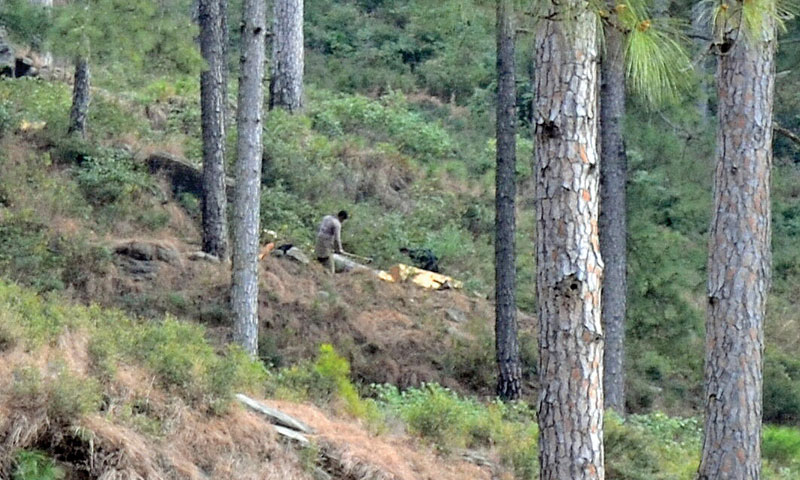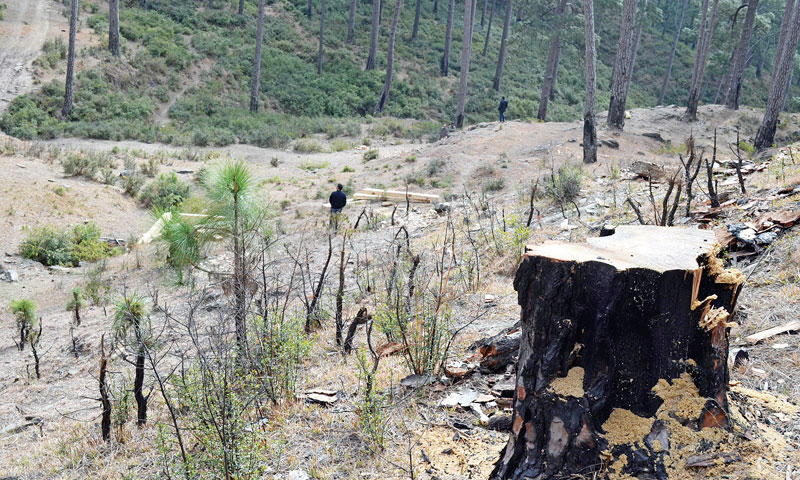MURREE: One can see people sitting around fire late in the night to warm themselves from the biting cold in the forest near Sorasi village of Murree tehsil.
Some of them are busy cutting trees with a chainsaw.
Sarwar Abbasi, 33, has never slept in the night during the last four years.
Unlike others, his work starts well after midnight. He chops trees along with a group of his fellow villagers.
Talking to Dawn, Abbasi said he does not have any other source of income.
“This is the only option I have to earn livelihood for my family,” he said.
“Earlier, it was difficult to cut trees with a simple saw but now we have chainsaw and it helps us to cut maximum trees within a short time,” he said.
He said officials of the provincial forest department did not mark any tree in the forests of Murree and Kotli Sattian tehsils of Rawalpindi district.
“It is easy for us to cut trees in different parts of the forests as there is no system of identifying trees,” he added.
Abbasi said timber mafia was involved in the smuggling of wood to other parts of the Punjab province. The forests of Murree are popular for ‘royal trees’ which are very expensive at timber depots located in different cities of Punjab and other provinces.
Like Abbasi, another resident of Mouri village of Murree tehsil, 40-year-old Ramzan Dhanyal has been working with the timber mafia for the last 12 years.
“Sometimes it is difficult for us to smuggle wood, so we get orders of furniture from different cities as there is no restriction on transportation of furniture,” he said.
“Despite the ban, timber mafia likes to cut trees and transport consignment of wood from Murree to Rawalpindi during night time as it is safe,” he added.
Ramzan claimed that it was impossible for timber mafia to cut and smuggle woods without the support of the local authorities, including officials of the forest and police departments.
Local people told Dawn that Rawalpindi had become a hub as well as a gateway for smuggling wood.
They said the illegal practice was continuing in different areas of Murree including Barmal, Manga, Samal, Karor, Khoti High School, Mouri, Sorasi, Barian, Gail, Angoori, Daryagali, Kalimatti, Ghoragali, Pagwari, Cheekagali and Masoot.
Raja Nadeem, 26, a resident of Karor village, alleged that logging was done at night in connivance with the forest department officials.
“All this happens with the consent of the forest department officials as it is not possible without their blessings. It is also easy to smuggle wood from different parts of the forests due to link roads,” he added.
Nadeem said the timber mafia was also behind the growth of unregistered chainsaw business functioning in almost all villages of Murree and Kotli Sattian tehsils.
“After cutting trees, the timber mafia smuggled furniture to different parts of the country. This furniture is high in demand because it is available at cheap rates,” he said.
Azam Khan, 48, a resident of Mouri, said the demand of wood increased during winter, and so did work for the local people.
“If the government provides gas to the area, the need for firewood would decrease in winter,” he said.
It is important to mention here that Murree and Kotli Sattian tehsils are famous for ‘royal trees’ including Chir Pine, Blue Pine, Deodar and spruce.
According to the officials of the forest department of Punjab, the total forest area in the country stood at 4.2 million hectares, which is about 4.8 pc of the total land area.
According to the United Nations Food and Agriculture Organisation (FAO) around 43,000 hectares of forest are cleared annually in Pakistan which has the highest deforestation rate in Asia.
The officials of the FAO believed that if deforestation continued at this pace, it was feared that Pakistan would lose most of its forests within the next 30 to 40 years.
An official of the forest department based in Karor said there were two types of forests – state forests and ‘Guzara’ forests.
“The owners of ‘Guzara’ forests are individuals but they cannot cut trees without the approval of the government,” he said.
He said according to the Forest Act 1927, vehicles carrying wood can move only during the day to avoid smuggling but the timber mafia transported its consignment from Murree to Rawalpindi during the night.
He added that some officials of the forest department had been working in the same area for many years and the forest department did not transfer them which also contributed to this illegal practice.
The official said the local timber mafia sold logs to the traders for around Rs 30 per cubic feet who then resold them for Rs 3,000 per cubic feet in the open market.
He said there were many private timber depots which were associated with the wood business without any check. It is necessary to get approval from the forest department before opening a timber depot, he added.
“There are big timber stores in Pirwadhai, Dhoke Hassu, Bagh Sardaran, Peshawar Road, Morgah, Sadiqabad, Khanna and Chaklala,” the official said.
An official of Peshawar-based Pakistan Forest Institute (PFI) said Pakistan succeeded in securing $3.8 million from the Readiness Fund of the World Bank-administered Forest Carbon Partnership Facility (FCPF) in December 2013 to restore forest and bring new land under tree plantation.
“Any initiative for reviving forestation could not be fruitful till action is taken against timber mafia in the country,” he said.
The official said the cutting down of trees in Murree was not only ruining natural beauty of the famous tourist destination but also badly affecting the environment.
Environmentalists believe that they did not think any conservation efforts will really save Pakistan’s rapidly shrinking forests as long as the government did not deal with the timber mafia with an iron fist.
They said Pakistan was now grappling with the consequences of large swathes of denuded forest.
It was also experiencing warmer summers and colder winters, fewer rains, frequent landslides, a rise in pest attacks on crops and a decline in bird population, they added.
Divisional Forest Officer (DFO) Rawalpindi, Abid Gondal told Dawn that he was supervising 70,000 acres in his division, adding that the forest department was facing severe shortage of financial and human resources.
“Is it possible for a security guard to protect 1,200 acres of forest land without a weapon,” he questioned. Mr Gondal said the forest department did not have any machinery to overcome fire as it was very common during the summer season.
He said according to the Forest Law of 1927, a DFO had the authority to confiscate illegal shipment of wood but this was rarely implemented. “It is necessary to amend law according to the present circumstances,” he added.
“Local people are working in the forest department which was why their efficiency level was not up to the mark,” he admitted.
Punjab Provincial Minister for Forestry, Fisheries and Wildlife, Mohammad Asif Malik told Dawn that the ministry was trying to overcome illegal tree cutting while hundreds of FIRs have been registered against those involved in illegal logging.
He said the government would allocate numbers to trees which could help stop illegal cutting in the province.
Mr Malik said the ministry would take action against illegal depots , adding that it had been suggested to the chief minister to set up a forest force to counter culprits.
















































